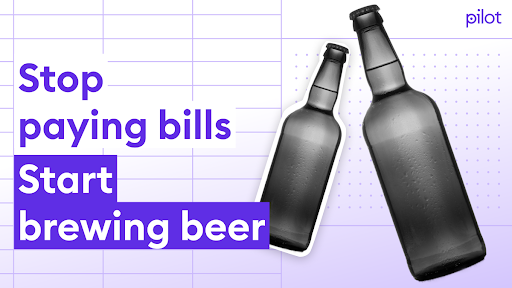5 errors that hold food and beverage companies back

The delivery truck breaks down mid-route, and a batch of products spoils. The packaging machine jams in the middle of a production run. A major retailer suddenly updates its supplier requirements—again.
In the food and beverage industry, a lot can go wrong, and often does. While some challenges are out of your control, many aren’t. Getting your operations and finances right can make the difference between a minor setback and a costly disaster.
We discuss five of the most common and costly operational mistakes that hold F&B businesses back in this article. The insights are based on our experience doing the books and finances for hundreds of food and beverage startups.
Just starting your business? Your top 10 questions answered →
1. Not updating systems and processes
Food companies often hold onto legacy systems that no longer serve them. Yes, it’s great to get a return on an old investment. But that old point-of-sale system (POS) and paper-based vendor order system will eventually cost you. The order software that worked when you had one distributor becomes a liability when you have seven.

Perhaps your workers are accustomed to the old systems. And yes, changing them out takes time and money. But you have to worry about more than just your systems. What about your competitors? If they have an order-fulfilling edge—if they can better forecast demand—that’s a very real advantage.
Don’t wait for your systems to break. Break them first yourself as you experiment.
Pro tip: Make a habit of always asking other owners what tech they use. Find a tinkerer on your team who wants to try them out.
2. Not acting on customer feedback
When the whole team is in the weeds, it’s difficult to think about feedback. All you can really manage is the present emergency. But while your crew may laugh it off at the pub that night, your customers won’t. They don’t easily forget.
While 80% of companies think they offer a great experience, only 8% of customers agree.
Most customers leave their feedback silently—they don’t buy your products again. You have to create an environment and culture that truly invites honesty. If you can’t create that in your staff (it can be done—teach employees to thank people for feedback), make anonymous feedback easy to give—just stars and a comment. Or provide a QR code on your product’s packaging for customers to leave reviews.
But this is crucial: If you ask for feedback, act on it. In a survey:
- 72% of customers say they never hear back after completing a survey.
- 71% assume the company won’t do anything about it.
If you ask for customer feedback, act on it, and show that you did. It can build your brand. When Starbucks launched a platform where customers could suggest improvements, they received 150,000 ideas and implemented 277. They then created a marketing campaign around it, and it was one of many initiatives that caused their stock price to grow 12x over the next decade.

Pro tip: Schedule time each week to go into online review platforms and actually respond to every review, positive or negative.
3. Not preparing for seasonal surges
Many food and beverage companies live some version of Groundhog Day each year, where they see the busy season coming, and then suddenly, it’s happening, and they didn’t prepare. Staff feel overworked, some quit, hiring their replacements is chaotic, and customers and vendors feel it.
You probably know those busy times but it’s time to collect some data on them. If you run a snacks or beverage company in Cincinnati, you know sports season is big. But did you know the city sees a 12% spike in food and alcohol sales on football Sundays?
We recommend doing some financial planning and analysis. (“FP&A,” to those in the industry.)
It isn’t exciting—most owners did not study finance—which is why it’s a great task to outsource. Have an accountant or fractional CFO go into your QuickBooks and ordering system and pull that data into a spreadsheet to ask:
- What are the major seasonal spikes in demand each year?
- What items do people order more of in those periods?
- How does it affect our profitability?
- Is there excess demand, and how much could we capture?
- How would this affect staffing and production?
The result should be a one-page plan about the changes you need to make, with a workback schedule for when to implement those changes. It’s what the big guys like Coca-Cola and Domino’s do, and in a fairly simple project, you can too.
Pro tip: If you are not managing your inventory entirely digitally, you probably aren’t capturing the information you need to make profitable busy-season decisions.
4. Not having a crisis management plan
Not long ago, Fonterra, one of the world’s largest dairy companies, announced a possible botulism contamination in their whey protein concentrate used in infant formula and sports drinks. A global recall followed. Entire countries banned its exports, including China, a key market for them.
Only later did Fonterra realize the contamination was a false alarm. False positives in the initial test led them to misidentify the bacteria, mistaking a harmless strain for a dangerous one.
Without a crisis plan, false alarms can hugely damage food and beverage companies, especially startups. FDA censures are not easily undone. And though Fonterra is big, fines are just as large for small companies, and you should have all your crisis management protocols written and in place.
For example, what will you do if:
- You detect a food safety issue
- The FDA sends you a warning letter
- You have to enact a food recall
- Cooling equipment fails, or the power goes out
- New tariffs disrupt your supply chain
It’s a lot for a small business to think about, but so are the fines and impacts. Take time to plan out exactly how you’ll respond step-by-step, and store those documents somewhere very obvious like in a red binder. And consider better sensor technology. New refrigerators may be able to send SMS text alerts or consider sensors from a supplier like Checkit.
5. Mis-tracking your finances
In our experience, smaller F&B businesses often have a friend or family member doing their books and taxes. While this might work at first and feels cost-effective, things get tricky as the business grows. Without the right expertise or enough time to focus on the details, this often leads to missing expenses, inaccurate reports, and cash flow problems.
For instance, if you don’t set up your financial ledger right the first time around, it affects your reporting. It means you can’t see certain categories or, say, tell the difference between full-time and contract labor costs.
Which means you can’t make clear decisions.

Poor financial tracking also makes it harder to secure funding, negotiate supplier deals, or plan for growth. Strong, well-organized financial books are the basis for other companies and organizations trusting you.
The solution is straightforward: get professional accounting help. You can hire an in-house bookkeeper or partner with a firm like Pilot's bookkeeping services. We’re the largest accounting firm in the U.S. dedicated to helping small businesses keep their books organized and get reliable financial reports to make smarter decisions.
Are your F&B operations built to scale?
Most companies get by with “good enough” operations. But if you plan to build a business that retains its employees, grows its partnerships, and doesn’t require you to work after hours, focus on the operations. At the very least, make improvements so it’s not what holds you back.
What else should we write about? Let us know at info@pilot.com.





